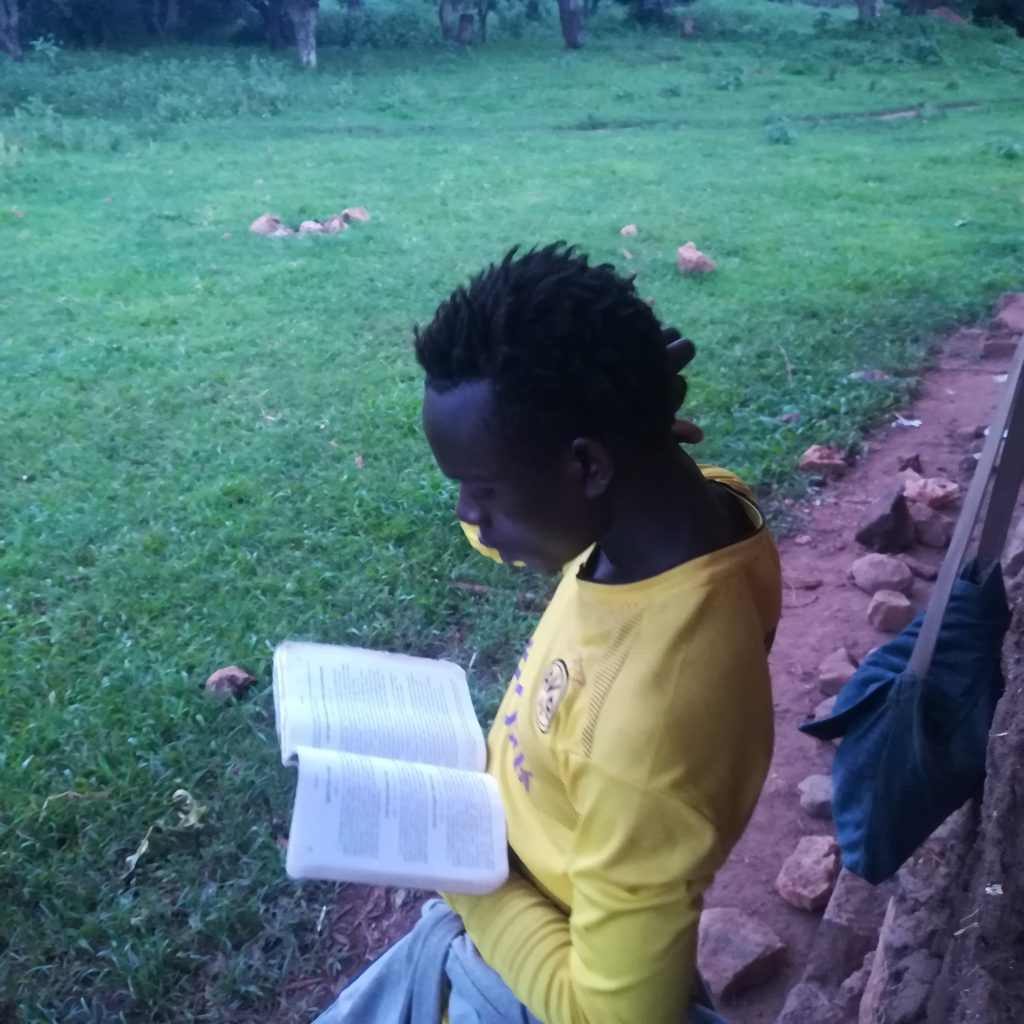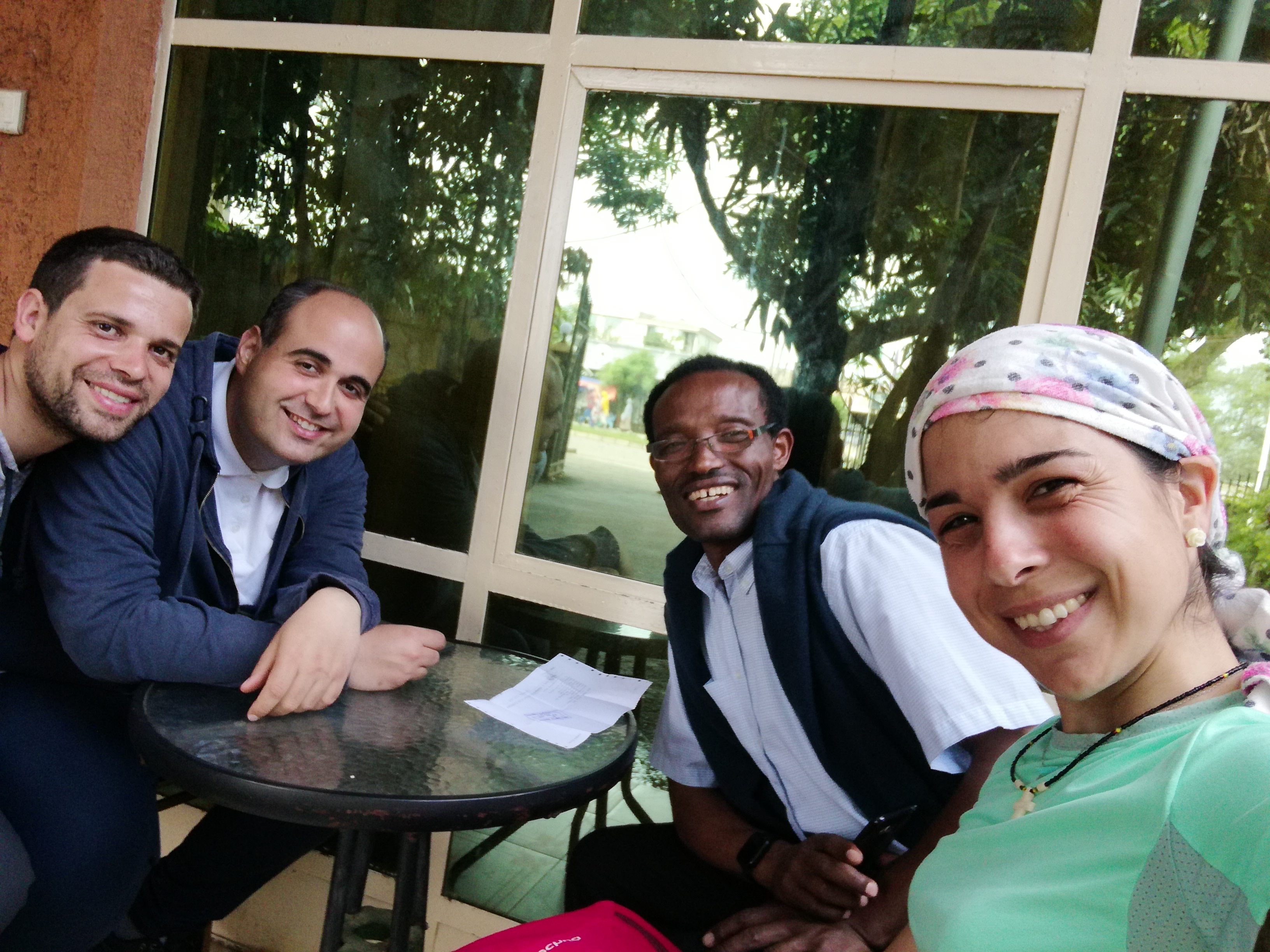To enter into a new culture is a trip that requires dedication and gradual knowledge. Not only in order to see the gray of the palette, but also and above all, to notice the various colors on the palette and dab with more strength the pinks, the greens, the blues, the yellows, the reds… It means to know how to appreciate things, like a little child curious to discover this world and the next, enriched by knowing how things work. Without judging. Always with new eyes. And this is difficult, especially when we have grown up, and carry our own luggage, our vices, our opinions on everything and much more stuff.
To enter into a new culture, the much heard of and blessed inculturation , also means making the most of the time we are in school with our fellow students of Amharic class and other languages, or the afternoons with the MCCJ (Comboni Missionaries of the Heart of Jesus), and common prayers, visits to museums, sharing food which is quite different over here and almost always with a touch of berber, a local specialty that makes everything very hot, and then the outings with the community to have an ice cream or a Coke (yes, even here you can have all this!)
To enter into the new culture is not only like imbibing from the cultural shock I mentioned in my last article, a shock that makes us come down from the mountain. It is also feeling thirsty in the midst of all this and climb the mountain again. Listen to it now, no matter what difficult it might be. This is what I am doing now, climbing a mountain. We were given two weeks of rest from our Amharic classes, while schools are closed for vacation, and so we had the chance to go to Benishangul-Gumuz for a week. That is where, God willing, we will start our mission in September. We also started a week of retreat.
I am currently in this retreat. It is an important time for me, to renew myself, to climb the mountain and to speak with God. It is a time to pray over all that I lived in Benishangu-Gumuz.
What did I see there? I remember as it were now the day we visited the villages of this area, where only the Gumuz live, to offer our catechesis. We left home about 4:30 in the afternoon. I traveled in the back of the 4×4 in the open air, even though there was room inside, where it would have been much safer because at any time it could have started to rain very hard, which is typical of this time of the year because we are in the kremt gizê (Amharic for rainy season). But I preferred the view, because it is always unique. Travelling outside also gave me the opportunity to spend time with the Gumuz catechists we were meeting. I did not know that the back of the vehicle was going to fill up with them, but that is what happened, because on the way to one of the Gumuz villages we were gathering several the young catechists. I watched the young catechists talking and laughing among themselves in their language, the Gumuzinha (another one I will have to learn), so I could not understand anything! In my mind I built up stories and phrases in Amharic in an attempt to talk to them. They also speak Amharic, but not all the Gumuz do. These are catechists picked by the MCCJ because they can be a bridge between the missionaries and the Gumuz. Besides giving their catechesis the also are Amharic-Gumuzinga translators and are the intermediaries between the Gumuz and us.
I then gathered some courage and started to talk with one of the catechists. We exchanged a half a dozen sentences. I felt friendship and the realization that I am different. The Gumuz are very friendly. Unlike the common reaction of many other Ethiopians who, when they see us, call us Farengi (foreigners), the Gumuz meet us with a smile. They see us as friends who have not forgotten them and are protecting them. They are very dark, unlike the typical Ethiopians who are a shade of brown. This is also one of the reasons they are marginalized, because many people do not see them as “racially” Ethiopian.

At a certain point the catechists were dropped off at different homes. We got off the vehicle with them and started calling the young people and the children to attend the catechesis. A handshake and we looked straight into one another eyes… How did I enjoy sharing this gaze! We called out to a lot of people, but not everyone came. They are still afraid to leave their homes, considering what happened in June, when they were attacked by the Amhara. Just the same, many catechumens attended in the darkness of the night and filled this home made of wood planks where we held the catechesis.
What I saw and lived that week in Benishangul-Gumuz awakened in me contrasting emotions. Among them ideas on projects to get started, but also fears and a feeling of inadequacy. And here, during this week of retreat, it was a time to regain my confidence, for the same reason that made me say Yes, the day he sent me, like Mary, “Here is the servant of the Lord. Let it be done according to your word.” Climbing the mountain, I realize that I am not able to accomplish the mission. I am not, and we are not. But we are not alone. Oh, to accept our human frailty, our weaknesses and our dependence from God’s love at times can be so difficult! Very often to be human means to seek control of our own life. But we are mistaken. Do not fool yourself, Carolina, you are not the owner of your life. It is God’s gift. Strangely, here during the retreat I lived the day of the Lord’s Transfiguration, making it personal. I prayed. I let (and still do) this transfiguration take place in me. In fact, all I need is “not to be afraid.” Because here, on this mountain, I once again accept God’s invitation: “Get up, look, cross over, follow me, just as you are… with fears, weaknesses, mistakes, but also with gifts. Accept yourself as I created you! Follow me!” And I follow.
And as I follow him I leave you with a tender hug. I ask you for a special prayer for the mission God wants us to establish there. That it may not be the result of our European ideas of mission, but rather the inspiration of the Holy Spirit, because mission will never be our own. Mission belongs to God.
Your friend and Comboni Lay Missionary, Carolina Fiúza
In RED – Digital Magazine of the Diocese of Leiria – Fátima, #30, July 25, 2019 (available in https://leiria-fatima.pt/noticias/subir-ao-monte/ )





![[Excursiones en comunidad: Pedro, David, el padre Endrias y yo.]](https://lmcomboni.org/blog/wp-content/uploads/2019/09/IMG_20190802_100025-1024x768.jpg)